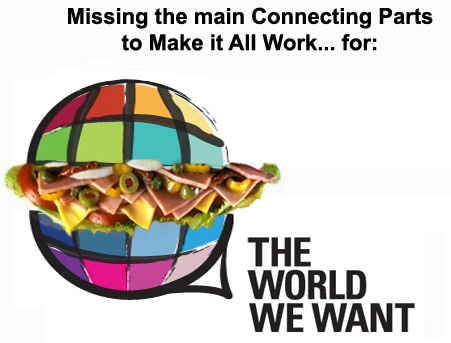Week 2: Development Challenges in a Changing World (11 Feb- 17 Feb)
on the UN http://www.worldwewant2015.org website

1. Which global trends and uncertainties may influence how environmental sustainability is framed in the international development agenda over the next 10-30 years?
There’s a major global shift that will continue, and upset virtually everything people are planning on, because people are NOT planning on our world economic growth model to stop producing growing economic returns. It financially relies on consuming the earth ever faster. That is produces ever shrinking returns.
You can see the physical evidence of it happening all over and as the main cause of our converging world crises, the world commodities crises, food crises, inequity and ‘missing middle’ crises, the related financial crises and ecological liability crises. It is giving us a world increasingly mired in conflicting interests, complexity, confusion, and indecision.
The real cause is an oddly deceptive but ultimately quite simple thing. Ant kind of competitive system driven to grow by compound investment of its own profits will change behavior this way… as reaching natural limits of growth causes it to swell with internal complications and conflicts of all sorts. It’s an ecological, not a political or social phenomenon, with extraordinarily grave political and social consequences.
These symptoms are the “signal” from the environment that continually expanding our use of nature is finally approaching its natural limits. I write quite a bit about it, from all sides. https://synapse9.com/signals
Over the next 10-15 years it seems virtually certain that all the present gains in social welfare resulting from the worldwide MDG and other socially purposed sustainability efforts will largely or totally be reversed. That result appears quite unavoidable unless people take an interest in, and come to understand, the natural consequences of relying on growth for prosperity and act promptly.
What causes the turmoil is that when there are no longer virgin resources to claim, the needs of more competitive users take precedence over all others… because they can pay higher prices, and the less competitive users get squeezed out. That multiplies by the positive feedback loop of investors using the profits to also invest more in the more competitive users driven to grow their own needs.
A related intellectual tragedy is that this is just the kind of great puzzle that scientists get ostracized for solving, again and again in history. In this case both Keynes and I among others saw the dilemma and understood the quite necessary answer long ago. He was repeatedly dismissed for bringing it up (in time to forestall our current chaos) and I’ve been repeatedly dismissed for bringing it up (in time to relive some of the worst symptoms and its natural end)…. People keep making the error of assuming that nature should follow our social values, and that’s mistaken.
- 2. What new elements and considerations would need to be incorporated into the post-2015 agenda for it to be environmentally sustainable and adequately capture the essence of the world’s evolving development/financial/social/ economic/ environmental/etc challenges?
Taking the commons approach (acting on the common interests of all) is the key. Commons Action for the UN (CAUN), has a proposal in this consultation process for a commons-based approach for both local commons and our global commons the UN should take for all sustainability efforts (1). For the global commons we describe “a way big money can both save itself and the world too”, outlined in one of the attachments to that proposal (2). It proposes “commons-based” institutions to help relieve our economic crises, and then lead us out of the woods to a world that works as a whole.
In concept it’s simply to realize ( having the ** insight ** ) that “growth” in both nature and social affairs is “building something”. Economic growth, in particular, is a physical creation of our niche on earth, and we don’t want to spoil our niche.
As you think through your own experiences of building things, at work or at home, executing grand plans or small ones, the natural way of building any kind of thing on *any* scale starts with a series of bigger and bigger steps. While you still have the option what you start needs to be completed to make the value of the work last, following smaller steps so the details actually work. Otherwise you run out of time, resources and your own enjoyment in building something fine, and risk being left with just making a mess.
1) CAUN proposal: The Global Commons Based Approach
2) Key “commons-based” institutions: ModelsOfCommonsInterests.pdf
3) Links to copies on CAUN site: Post 2015 Submission
